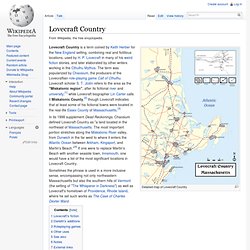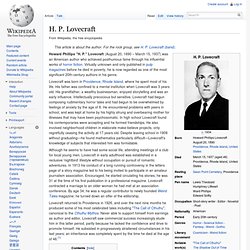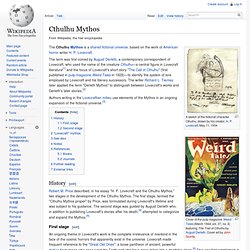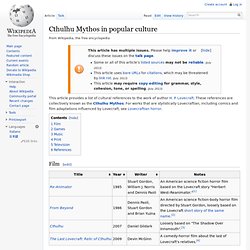

The Complete works of H. P. Lovecraft. Lovecraft Country. Detailed map of Lovecraft Country Sometimes the phrase is used in a more inclusive sense, encompassing not only northeastern Massachusetts but also the southern hills of Vermont (the setting of "The Whisperer in Darkness") as well as Lovecraft's hometown of Providence, Rhode Island, where he set such works as The Case of Charles Dexter Ward.

Lovecraft's fiction[edit] Map of Lovecraft country. In a 1930 letter to Robert E. Howard, Lovecraft attempted to explain his fascination with New England as a setting for weird fiction: "It is the night-black Massachusetts legendary which packs the really macabre 'kick'. Lovecraft first mentioned Arkham's Miskatonic University in Herbert West–Reanimator, written in 1921-1922. Derleth's additions[edit] August Derleth, Lovecraft's friend and literary executor, discouraged other Cthulhu Mythos writers from setting their stories in Lovecraft's New England. Roleplaying games[edit] New Tales of the Miskatonic Valley (2009) Other uses[edit] See also[edit] The H. P. Lovecraft Historical Society. H. P. Lovecraft bibliography. H. P. Lovecraft.
Howard Phillips "H.

P. " Lovecraft (August 20, 1890 – March 15, 1937) was an American author who achieved posthumous fame through his influential works of horror fiction. Virtually unknown and only published in pulp magazines before he died in poverty, he is now regarded as one of the most significant 20th-century authors in his genre.
Lovecraft was born in Providence, Rhode Island, where he spent most of his life. His father was confined to a mental institution when Lovecraft was 3 years old. Although he seems to have had some social life, attending meetings of a club for local young men, Lovecraft in early adulthood was established in a reclusive 'nightbird' lifestyle without occupation or pursuit of romantic adventures. Lovecraft returned to Providence in 1926, and over the next nine months he produced some of his most celebrated tales including "The Call of Cthulhu", canonical to the Cthulhu Mythos.
Early life[edit] Family[edit] Lovecraft at c. nine years old Upbringing[edit] Lovecraftian horror. Lovecraft Country. Cthulhu Mythos. A sketch of the fictional character Cthulhu, drawn by his creator, H.

P. Lovecraft, May 11, 1934 The Cthulhu Mythos is a shared fictional universe, based on the work of American horror writer H. P. Lovecraft. The term was first coined by August Derleth, a contemporary correspondent of Lovecraft, who used the name of the creature Cthulhu—a central figure in Lovecraft literature[1] and the focus of Lovecraft's short story "The Call of Cthulhu" (first published in pulp magazine Weird Tales in 1928)—to identify the system of lore employed by Lovecraft and his literary successors. Authors writing in the Lovecraftian milieu use elements of the Mythos in an ongoing expansion of the fictional universe.[3] History[edit] Robert M. First stage[edit] An ongoing theme in Lovecraft's work is the complete irrelevance of mankind in the face of the cosmic horrors that apparently exist in the universe.
There have been attempts at categorizing this fictional group of beings, and Phillip A. David E. Cthulhu Mythos in popular culture. This article provides a list of cultural references to the work of author H.

P. Lovecraft. These references are collectively known as the Cthulhu Mythos. For works that are stylistically Lovecraftian, including comics and film adaptations influenced by Lovecraft, see Lovecraftian horror. Film[edit] Games[edit] Music[edit] Print[edit] Television[edit]